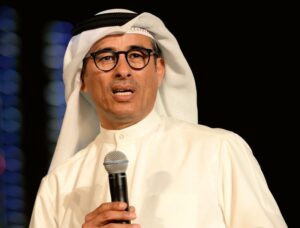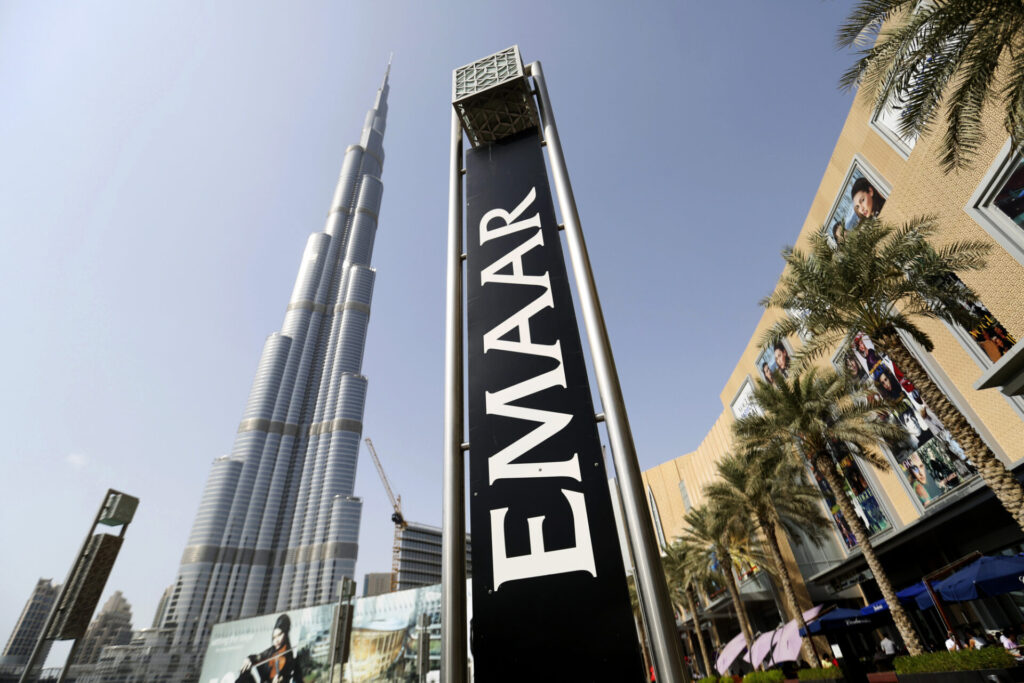The world of real estate has seen many titans rise, but few have left a mark as Muhammad bin Ali Alabbar. From his modest beginnings to founding Emaar Properties, now recognized as the world’s largest real estate company, Alabbar’s story is one of ambition, vision, and relentless pursuit of excellence. Today, Emaar Properties is synonymous with iconic landmarks like the Burj Khalifa and The Dubai Mall. But how did a young boy from Dubai grow into a global business magnate, transforming skylines and setting new standards in the real estate industry? This article delves into the extraordinary life of Muhammad bin Ali Alabbar, the founding and growth of Emaar, its current status, and the ambitious plans that are shaping its future.

Early Life: A Foundation Built on Hard Work and Education
Born in 1956 in Dubai, United Arab Emirates, Muhammad bin Ali Alabbar’s early life was steeped in values of hard work, education, and resilience. His father, a captain in the dhow trade, navigated the Arabian Gulf’s waters, engaging in maritime commerce that would profoundly influence young Muhammad. From the tender age of 10, Alabbar accompanied his father on these voyages, observing the intricacies of business negotiations and trade practices. These early experiences planted the seeds of business acumen that would later flourish into a global empire.
Education was paramount in the Alabbar household, and Muhammad excelled academically, demonstrating an early aptitude for numbers, finance, and strategic thinking. His passion for business led him to pursue a degree in Finance and Business Administration from Seattle University in the United States. His time in America broadened his horizons, exposing him to international business practices and instilling in him a global perspective. This exposure ignited a drive to bring international standards and innovative practices back to his homeland, laying the foundation for what would become a revolutionary career.
The Birth of Emaar Properties: A Vision for a New Dubai
Armed with a wealth of knowledge and an unyielding determination to make a difference, Muhammad bin Ali Alabbar returned to Dubai, eager to apply his skills. His early career saw him take up a notable position as the Director General of Dubai’s Department of Economic Development. In this role, Alabbar played a crucial part in shaping policies that spurred investment and economic growth, laying the groundwork for Dubai’s transformation into a global business hub.
In 1997, driven by a vision to reshape Dubai’s skyline and contribute to its economic diversification, Alabbar founded Emaar Properties. His inspiration stemmed from a desire to create world-class developments that would position Dubai as a premier destination for business, tourism, and luxury living. He envisioned Emaar as a pioneer in mixed-use developments, integrating residential, commercial, and leisure spaces to create vibrant, self-sustained communities.
The journey of Emaar was not without its challenges. Securing financing for large-scale developments in a still-emerging global market was a significant hurdle. Investors were cautious, and gaining the trust of stakeholders required strategic foresight and tenacity. However, Alabbar’s unwavering determination, coupled with his ability to articulate a compelling vision, played a crucial role in overcoming these early obstacles. His commitment to excellence and innovation attracted top talent, establishing a culture of high standards within the company. Strategic partnerships and collaborations further solidified Emaar’s reputation, setting the stage for its rapid growth and expansion.
Emaar’s Rise: Iconic Projects and Strategic Growth
Emaar’s ascent to global prominence is marked by several significant milestones and landmark projects. One of the company’s first major successes was the development of Dubai Marina, a man-made canal city that has become emblematic of modern Dubai. This ambitious project showcased Emaar’s ability to execute large-scale, complex developments, setting a new benchmark for real estate in the region.
But perhaps the most iconic project undertaken by Emaar is the Burj Khalifa, completed in 2010. Standing at 828 meters, it is the tallest building in the world and a testament to Emaar’s vision and capabilities. The Burj Khalifa was more than just a skyscraper; it was a symbol of Dubai’s aspirations and Emaar’s commitment to pushing the boundaries of architectural excellence. Another major milestone was the development of The Dubai Mall, one of the largest shopping malls globally, which opened in 2008. The mall has become a premier destination for retail, dining, and entertainment, attracting millions of visitors annually.
Emaar’s ability to forge strategic partnerships has been instrumental in its success. Collaborations with luxury brands, hospitality giants, and international developers have resulted in unique, high-quality projects. The Armani Hotel in the Burj Khalifa, a collaboration with the fashion house Armani, is just one example of how Emaar has leveraged partnerships to enhance its offerings and reputation.
Expansion and Diversification: Emaar’s Global Footprint
Emaar’s growth strategy has involved both geographical and sectoral expansion, allowing the company to diversify its portfolio and tap into new opportunities. Initially focused on Dubai, Emaar quickly recognized the potential for growth in other markets. The company expanded its footprint internationally, entering new markets in the Middle East, North Africa, Asia, Europe, and North America. This strategic expansion involved a combination of joint ventures, acquisitions, and organic growth, allowing Emaar to cater to the specific needs of each market.
For instance, in Turkey, Emaar developed the Emaar Square Mall in Istanbul, a luxury shopping and residential complex that has become a major attraction. In Egypt, the company developed Uptown Cairo, a mixed-use community that blends modern living with historical charm. Sectoral expansion has also been a critical component of Emaar’s growth strategy. The company diversified into hospitality, retail, and leisure, creating a well-rounded portfolio that reduces reliance on any single segment. Emaar Hospitality Group, for instance, manages a growing number of hotels and resorts, including The Address Hotels and Resorts and Vida Hotels and Resorts.
The Present and Future: Leading with Innovation and Sustainability
Today, Emaar Properties stands as a global powerhouse in the real estate industry, renowned for its iconic developments and innovative approach. With total assets exceeding $20 billion and annual revenues surpassing $6 billion, Emaar continues to lead the way in redefining urban living. The company is currently involved in several major projects, including the Dubai Creek Harbour, which aims to create a new urban hub centered around the Dubai Creek Tower, set to surpass the Burj Khalifa in height. Another significant project is Emaar Beachfront, a luxurious waterfront community offering stunning views and world-class amenities.
At the core of Emaar’s success is a strong corporate culture that emphasizes innovation, excellence, and sustainability. The company integrates advanced construction techniques, smart home systems, and digital marketing strategies to stay ahead of the competition. Sustainability is another key focus for Emaar, with significant efforts made to minimize environmental impact and promote eco-friendly practices. Projects like the Dubai Creek Harbour incorporate sustainable design principles to achieve high environmental standards, with energy-efficient buildings, extensive public transportation options, and green infrastructure that reduces the overall carbon footprint.
Conclusion: A Legacy of Vision and Leadership
Muhammad bin Ali Alabbar’s journey from humble beginnings to global dominance is a testament to vision, determination, and strategic thinking. Under his leadership, Emaar Properties has transformed from a local real estate company into a global powerhouse, renowned for its iconic projects and innovative approach. As Emaar continues to grow and redefine urban living, it remains poised to maintain its status as a leader in the real estate industry for years to come.
Also Read: The Rise of Aramco: From a Small Oil Company to a Global Powerhouse
To read more content like this, subscribe to our newsletter
Go to the full page to view and submit the form.

